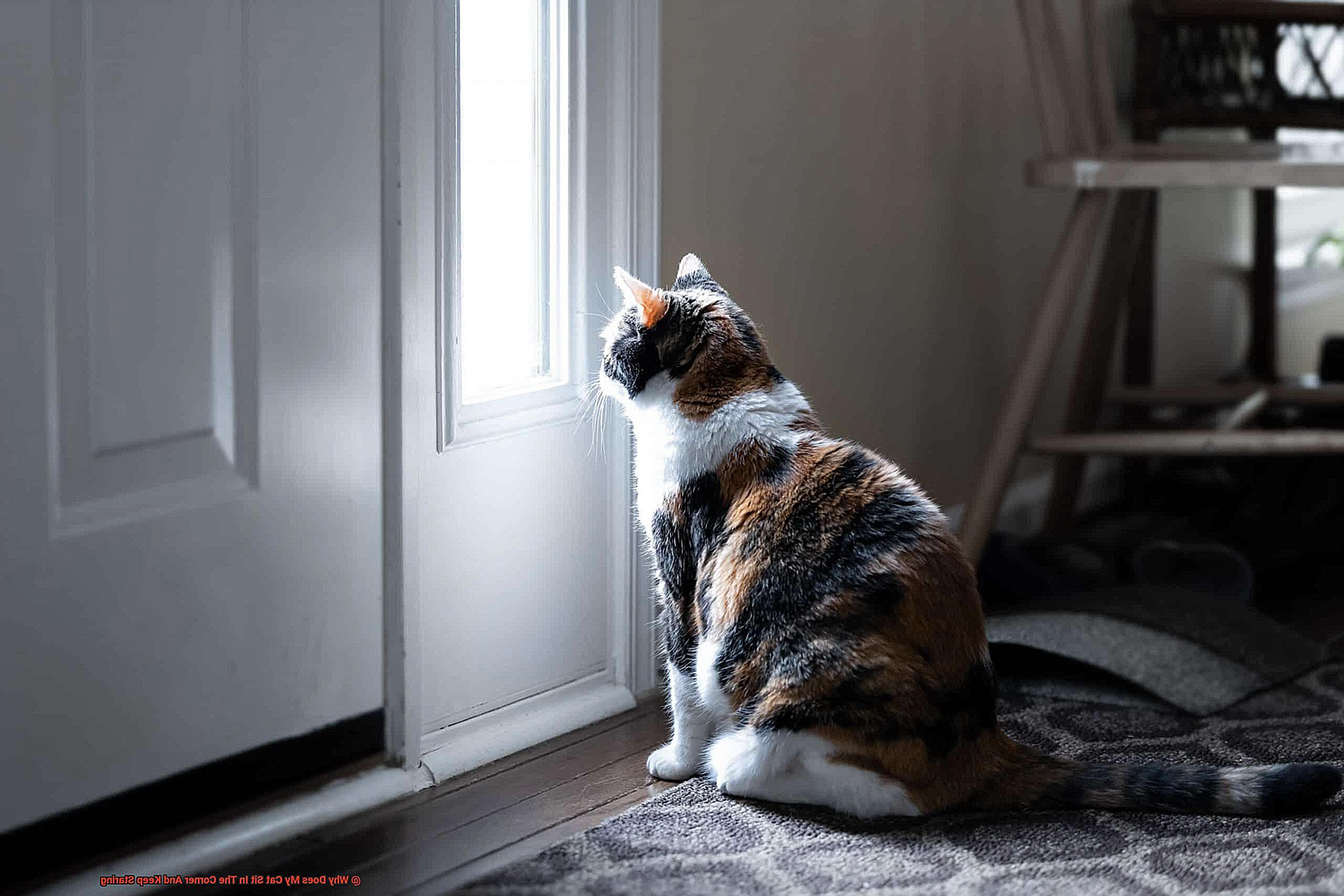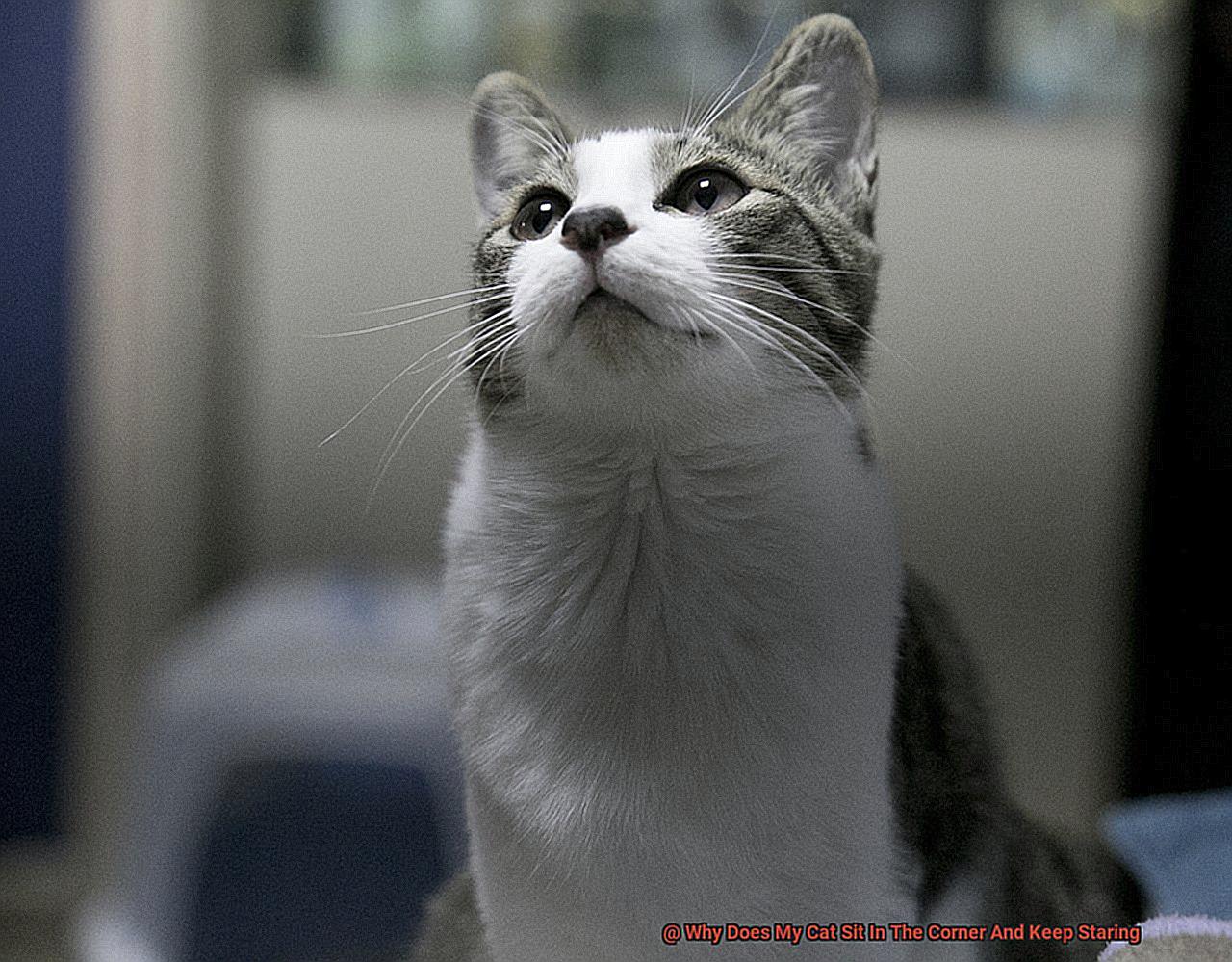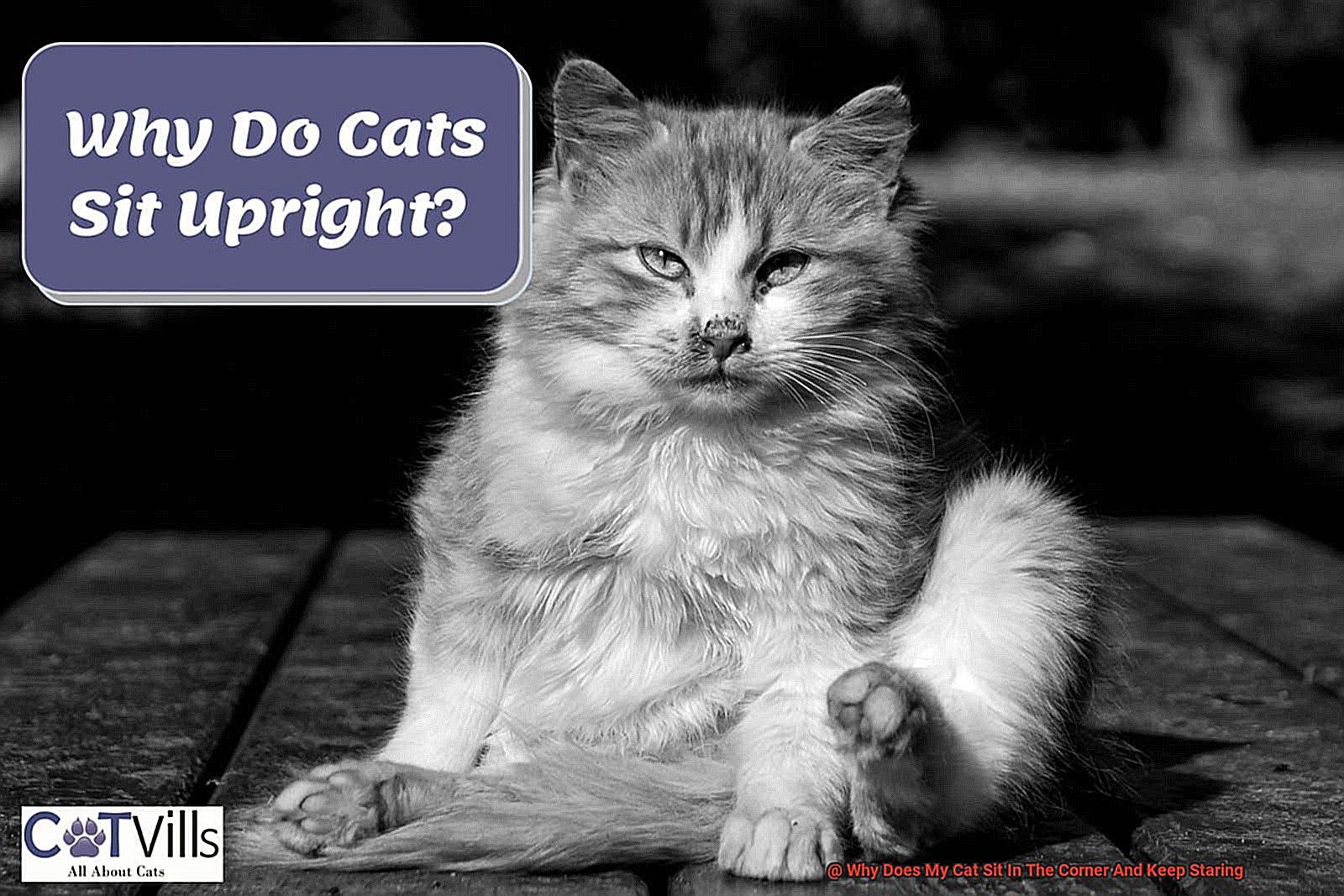Do you ever notice your cat standing in the corner of a room, silently staring off into space? You may be wondering why they do this and if it’s normal. It turns out that cats often stand in the corner and keep staring for various reasons.
In this blog post, we’ll explore why cats sit in the corner and keep staring, what it does for their health and wellbeing, and how to discourage them from doing so.
Cats are naturally curious creatures that are drawn to corners because they offer an unobstructed view of their environment. Staring is also a way for cats to see without being seen – a good way to spot potential threats or prey.
Humans and other animals may also gaze at one another as a way to communicate or establish relationships without words. Additionally, cats might be anxious or scared due to environmental changes or loud noises around them.
Lastly, cats can stare if they’re sick or injured. If your cat has been acting differently lately, it could indicate that something is wrong and it’s time for a vet visit.
So why does my cat sit in the corner and keep staring? The answer is complicated but usually boils down to curiosity, communication, or health issues – all of which require our attention if we want our furry friends to be happy and healthy.

Territory and Security: Cats Seeking Protection and Shelter
This behavior may seem strange at first, but there are actually a few reasons why cats may exhibit this behavior. Cats have an instinctive need to seek out protected spaces and observe their environment as a means of assessing threats and maintaining their sense of security.
In the wild, cats would naturally seek out places where they could hide from predators and protect themselves from harm. Domesticated cats still possess this instinct, and they may curl up in corners if they feel threatened or insecure.
This could be caused by changes in their environment such as the introduction of a new pet or family member or a change in routine. It could also be a sign of an underlying health issue, so it’s important to pay close attention to your cat’s behavior.
In addition to seeking out protected spaces, cats may also be suffering from boredom or hunger if they are sitting in corners for extended periods of time. Cats are intelligent creatures and need physical stimulation to avoid boredom.
When they lack equipment for play or social interaction, they may find themselves sitting in corners as a way to pass their time.
Predatory Instincts: Cats Keeping an Eye on Their Surroundings
Cats are known to be patient hunters and will sit and observe until they spot their desired prey. With their excellent eyesight, they can easily detect any movements in their environment, even in low light conditions.
However, cats don’t always stare at their surroundings due to their predatory instincts. If a new person or pet is introduced to the area, your cat may sit in a corner and observe the newcomer cautiously.
This behavior is normal for cats, but if it seems to be accompanied by other signs of distress such as loss of appetite or excessive meowing, it’s best to seek veterinary advice right away.
Anxiety and Stress: Cats Retreating to a Corner for Comfort
Cats are highly sensitive creatures and can easily become overwhelmed by changes in their environment or routine.

When they feel anxious or stressed, they often retreat to a corner as a way to hide and feel safe. If your cat is suddenly spending more time in corners than usual, it could be a sign that they are feeling anxious or overwhelmed.
Fortunately, there are some steps you can take to help your cat feel more relaxed and secure in their environment. First, try to identify any potential stressors in the cat’s environment and avoid them if possible.

This could mean making changes to their routine or keeping them away from loud noises or other stressful situations. Additionally, make sure your cat has plenty of hiding spots around the house so they can escape when they feel anxious or stressed.
Spending extra one-on-one time with your cat through play, grooming, or snuggles can also help reduce their anxiety and make them feel more relaxed.
If your cat’s behavior changes persist or become more severe, it may be worth consulting with your veterinarian to rule out any underlying health conditions that could be contributing to their anxiety or stress.
Boredom: Cats Lacking Stimulation or Resources for Play
Cats are complex creatures, and one of the most common signs of boredom or lack of stimulation is when they sit in a corner and stare into space. As natural hunters and explorers, cats need mental and physical stimulation to stay healthy and entertained.
When they lack the resources, space, or attention necessary for play or exploration, they may become bored or stressed, leading to a variety of behavioral issues.
Common signs of boredom include excessive meowing, scratching, sleeping, hiding, avoiding contact with their owners or other pets, and destructive habits such as chewing on furniture or curtains or urinating outside the litter box.
To prevent boredom and provide the necessary stimulation for your cat, you should make sure they have access to a variety of toys and scratching posts that mimic their natural behavior. Additionally, interactive playtime with toys like lasers or feathers can help keep them engaged.
Creating a positive environment for your cat also helps prevent boredom.
Provide them with a comfortable sleeping spot along with plenty of affection and attention from you. Give them opportunities to watch or interact with other animals or wildlife outside as well.
Signs of Illness or Injury: When to Seek Veterinary Care
While it may look strange, cats do it for a variety of reasons. However, if your cat is exhibiting this behavior for an extended period of time, it could be a sign of sickness or injury.
That’s why it’s so important to be aware of the signs of illness or injury in cats and take them seriously. Common signs include changes in appetite, vomiting, coughing, sneezing, limping and aggression. If your cat exhibits any of these symptoms, you should take them to the vet immediately.
Behavioral changes can also indicate that something is wrong with your cat. If they are suddenly hiding or avoiding contact with you and their environment, it could be a sign of anxiety or pain.
Similarly, if your cat is sitting in the corner and staring for an extended period without responding to their environment or attempts to engage them, it may be a sign of neurological issues and should be checked out by a vet right away.
It’s essential to remember that cats are incredibly sensitive animals that rely on us to keep them safe and happy. If you notice any concerning signs or behaviors with your feline friend, don’t hesitate to seek veterinary care as soon as possible.
Creating a Safe Environment for Your Cat
Creating a safe and secure environment for your cat is essential for their physical and emotional wellbeing. Cats are curious creatures by nature, and they love to explore their surroundings. However, providing them with a safe haven involves more than just giving them enough space to roam.

First of all, it’s important to provide your cat with enough vertical space to satisfy their needs for climbing, jumping, and scratching. Shelves or cat trees are great options that can help fulfill these needs.

Secondly, you should keep toxic substances or dangerous objects away from their reach. Cats can be very curious and may ingest poisonous substances or injure themselves by playing with sharp objects; therefore, make sure that household cleaners, medications, and other hazardous substances are kept secure and out of sight.
Finally, cats thrive in peaceful environments so try to create a quiet atmosphere at home for your feline friend. Loud noises or sudden movements can cause stress or anxiety so offer them with a cozy bed or secluded corner where they can retreat when needed.
Providing Mental Stimulation for Your Cat
Cats are intelligent and curious creatures, and providing them with mental stimulation is essential for their overall happiness and health. It can help prevent boredom, addictive behavior, and even anxiety. Fortunately, there are a few easy ways to give your cat the stimulation they need.
Interactive toys are a great way to get your cat’s mind working. Toys such as wand toys, puzzle feeders, and robotic toys will encourage your cat’s natural hunting habits while providing a sense of achievement. These types of toys also give your cat something to think about when they get anxious or stressed.
Interactive playtime is another way to provide mental stimulation for cats. Playing hide-and-seek, chasing games, or playing with toys will help develop a strong bond between you and your pet while keeping them entertained. It’s important to vary playtime activities in order to keep their interest piqued.
Puzzles and games can also be used to stimulate cats mentally. Cats love exploring new objects and situations – hiding treats or toys around the house, placing obstacles in their environment, or giving puzzles to solve can keep cats engaged and interested for hours on end.
Establishing a Bond with Your Cat
Cats are intelligent creatures, and creating a lasting relationship with them requires patience, care, and dedication. Here are a few tips for forging an unbreakable friendship with your cat.
Firstly, spending quality time with your cat is essential for establishing a connection. Cats love to play, so interactive play sessions are the perfect way to get them involved and build community. Choose toys that your cat enjoys playing with and involve them in games that require their natural hunting skills.
Grooming is another great way to boost confidence and strengthen the bond between you and your cat. While also providing an opportunity for physical contact, brushing their fur, cleaning their ears, and trimming their nails will help create a more comfortable environment.
Understanding your cat’s personality as well as its behavior is key. Some cats are more independent while others are more social; observing your cat’s behavior will help you understand their preferences better. Respect your cat’s boundaries.
Conclusion
Understanding your cat’s needs is like building a bridge between two worlds. To get the best environment for your beloved companion, you’ll need patience, knowledge and dedication. Quality time spent together, grooming and getting to know their personality will all help to strengthen the bond between you and your pet.
Interactive toys, puzzles and games will keep them entertained and amused while providing mental stimulation at the same time. Cats are curious creatures that require physical exercise to stay healthy and happy – they also need a secure environment with plenty of vertical space, hiding spots and play equipment.
It’s important to be aware of potential signs of illness or injury in cats because they can’t tell us when something is wrong. Look out for changes in appetite, vomiting, coughing or sneezing – if you notice any of these symptoms then don’t hesitate to seek veterinary assistance as soon as possible.







